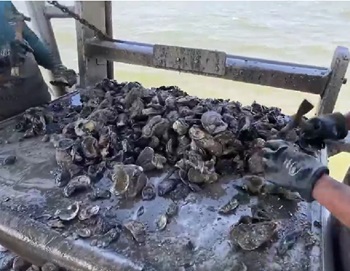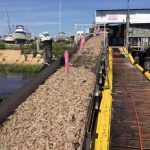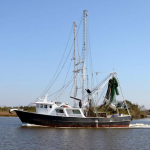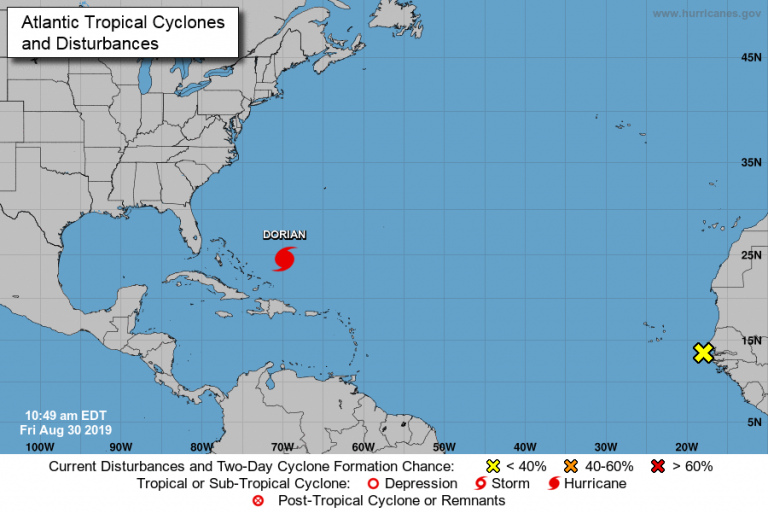Tag Archives: National Environmental Policy Act
Tribal groups, seeking restrictions on Alaska’s Bering Sea trawlers, get day in court
 U.S. District Court Judge Sharon Gleason heard oral arguments Thursday in a lawsuit filed by two of Alaska’s largest tribal groups against federal managers of the state’s groundfish trawl fisheries. The Association of Village Council Presidents and the Tanana Chiefs Conference claim the federal government has failed to adjust trawling rules in the Bering Sea and off the Aleutian Islands to compensate for the ongoing salmon crisis on Alaska’s Interior rivers. Victory by the plaintiffs could lead to new restrictions on the world’s largest trawl fishery. If plaintiffs lose, the status quo is likely to continue. On Thursday, Gleason asked plaintiffs whether they’re seeking a halt to trawl fishing in the Bering Sea. No, the plaintiffs said. more, >>CLICK TO READ<< 11:27
U.S. District Court Judge Sharon Gleason heard oral arguments Thursday in a lawsuit filed by two of Alaska’s largest tribal groups against federal managers of the state’s groundfish trawl fisheries. The Association of Village Council Presidents and the Tanana Chiefs Conference claim the federal government has failed to adjust trawling rules in the Bering Sea and off the Aleutian Islands to compensate for the ongoing salmon crisis on Alaska’s Interior rivers. Victory by the plaintiffs could lead to new restrictions on the world’s largest trawl fishery. If plaintiffs lose, the status quo is likely to continue. On Thursday, Gleason asked plaintiffs whether they’re seeking a halt to trawl fishing in the Bering Sea. No, the plaintiffs said. more, >>CLICK TO READ<< 11:27

Fisheries Survival Fund Calls for Reevaluation of Draft PEIS on Offshore Wind Development Impacts on Scallop Fisheries in the New York Bight
The Fisheries Survival Fund (FSF) has submitted to the Bureau of Ocean Energy Management (BOEM) regarding the Draft Programmatic Environmental Impact Statement (Draft PEIS) for the New York Bight Wind Energy Area. The FSF, representing the majority of full-time Limited Access scallop fishermen on the East Coast, has raised significant concerns over the inadequacies of the Draft PEIS in addressing the impacts of offshore wind development on scallop fisheries, which are among the most valuable federally-managed commercial fisheries in the United States. The FSF argues that the Draft PEIS, while prepared under the National Environmental Policy Act (NEPA) and Outer Continental Shelf Lands Act (OCSLA), fails to adequately mitigate the impacts of offshore wind development on the Mid-Atlantic scallop resource and does not sufficiently reduce wind farm interference with scallop fishing activities. more, >>click to read<< 06:55
Dawn Buckingham: Can Texas Stop Biden from Building a Massive Wind Farm Off Its Coast?
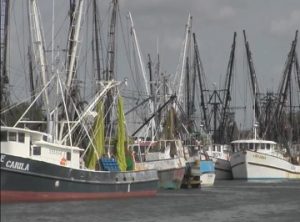 As a ninth-generation Texan, I have always loved and respected our beautiful coast, its vibrant economy, and the hard-working men and women whose livelihoods depend on the preservation of these waters. Since taking the helm of the General Land Office as the first female Land Commissioner in state history, I have also had the immense responsibility of stewarding over 13 million acres of state lands, protecting our state’s open beaches, and providing critical relief to Texans in the aftermath of hurricanes and other major storms. Texas commercial fishermen stand to lose a huge swath of navigable waters containing rich fisheries. This project could absolutely devastate this vital industry, robbing families of high-paying jobs, ending family businesses that span generations, and ultimately making the entire United States more dependent on seafood imports from places like China. >click to read< 11:57
As a ninth-generation Texan, I have always loved and respected our beautiful coast, its vibrant economy, and the hard-working men and women whose livelihoods depend on the preservation of these waters. Since taking the helm of the General Land Office as the first female Land Commissioner in state history, I have also had the immense responsibility of stewarding over 13 million acres of state lands, protecting our state’s open beaches, and providing critical relief to Texans in the aftermath of hurricanes and other major storms. Texas commercial fishermen stand to lose a huge swath of navigable waters containing rich fisheries. This project could absolutely devastate this vital industry, robbing families of high-paying jobs, ending family businesses that span generations, and ultimately making the entire United States more dependent on seafood imports from places like China. >click to read< 11:57

Offshore Wind Litigation: Court Declines to Halt Vineyard Wind Construction
A federal court has denied a request by members of the fishing industry to pause offshore construction of the Vineyard Wind Project (Project), the first modern utility-scale offshore wind project in the United States to receive all permits and approvals necessary to begin construction. On May 25, 2023, Judge Indira Talwani of the US District Court for the District of Massachusetts denied a motion for stay, or in the alternative, for preliminary injunction,,, In Seafreeze Shoreside, Inc. et al. v. US Department of the Interior et al., the plaintiffs alleged that the Bureau of Ocean Energy Management (BOEM) and various other federal permitting agencies violated the National Environmental Policy Act (NEPA), the Outer Continental Shelf Lands Act (OCSLA), and a variety of other statutes and regulations by issuing the Project’s lease and its final approvals. >click to read< 16:57

Lawsuit claims US federal government violated regulations in approving Massachusetts offshore wind project
A Texas non-profit research institute that aims to promote free enterprise in Texas and the nation is acting on behalf of fishing companies in Massachusetts, a state 2,000 miles away, in a lawsuit that seeks to stop development of the Vineyard Wind offshore wind project. The Texas Public Policy Foundation (TPPF) has named the US Department of the Interior, the US Department of Commerce, the US Department of Defense and other agencies and individuals as defendants in the suit. The lawsuit, filed in December 2021, claims the defendants violated the Outer Continental Shelf Lands Act, the Endangered Species Act, the Clean Water Act, the Marine Mammal Protection Act, the National Environmental Policy Act, and their respective rules and regulations. >click to read< 10:54
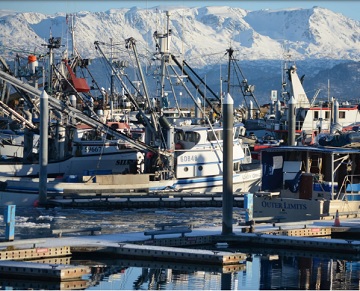
Lawsuit threatens to shut down Southeast salmon troll fishery
An ongoing lawsuit by a Washington State environmental group is threatening to shut down the Southeast Alaska salmon troll fishery in the summer and winter to help endangered Puget Sound orca whales, and has prompted the trollers to ask the City of Sitka to help pony up for legal bills. The Seattle-based group Wild Fish Conservancy filed suit last year and a federal court ruled last August that the National Marine Fisheries Service had violated the Endangered Species Act and the National Environmental Policy Act in approving salmon harvests in the Southeast troll fishery, which catches chinook salmon, a key food source for the Puget Sound orcas. In the meantime, lawsuits and rulings are continuing. >click to read< 08:36
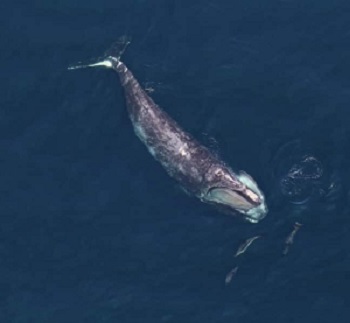
North Atlantic Right Whale: Oceana Wins First Step In USMCA Complaint
The Secretariat for the Commission for Environmental Cooperation, part of the United States-Mexico-Canada Agreement (USMCA), has agreed to move forward with the first step in a two-step process to investigate the USA’s failure to uphold its environmental laws to protect North Atlantic right whales, according to an Oceana announcement this week. The decision was in response to Oceana’s filing the first-ever “Submission on Enforcement Matters” against the US government under the USMCA last October. The ocean advocacy organization claimed the government has violated the USMCA by failing to enforce environmental laws to protect critically endangered North Atlantic right whales, of which only around 330 remain. >click to read< 14:53

ACK Residents Against Turbines not aligned with fossil fuel money
The Jan. 21 article by Doug Fraser, “Nuclear and Fossil Fuel Advocates, Wind Foes Among Backers of Right Whale Protection Suits,” misleads the public by attempting to draw a false link between ACK Residents Against Turbines, which opposes development of industrial-scale wind farms off the coast of New England, and other groups associated with the fossil fuel industry. Some groups oppose industrial offshore wind development because it will harm pristine ocean views enjoyed by all; others are opposed to the dramatic increase in electric rates experienced by countries that have adopted it or to the devastating impact it will have on commercial fishing. These are all valid concerns. ACK Residents Against Turbines is opposed to the industrialization of our ocean because the turbines, massive offshore substations, and vast undersea high voltage cable systems will damage the fragile marine ecosystem. >click to read< 15:12 By Vallorie Oliver President, Nantucket Residents Against Turbines
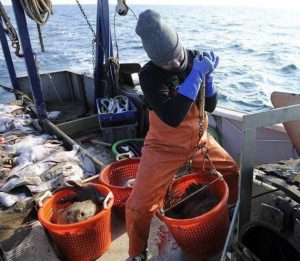
Northeast Seafood Coalition questioning the NEFMC fish monitoring regulation process
The New England Fishery Management Council is set to resume action on the contentious groundfish monitoring amendment next week, but the Gloucester-based Northeast Seafood Coalition is questioning whether the council is rushing its own process and operating with incomplete information. The council, scheduled to meet for three days next week in Portsmouth, New Hampshire, will return Wednesday to the arduous task of completing Amendment 23, which will set monitoring levels for vessels operating within the Northeast multispecies groundfish fishery. >click to read< 13:36
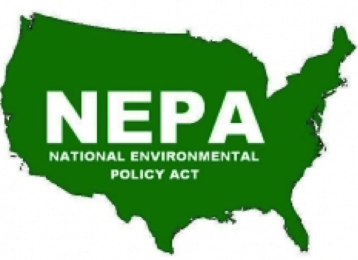
NEPA: Taming The Environmental Beast That Was Meant To Be A Watchdog
What was first proposed by Congress as a modest law to assess the environmental impact of highway construction and other publicly owned projects, has grown into a bureaucratic monster, the likes of which no one ever imagined. Nearly a half-century ago, before major federal environmental laws existed, Congress wanted to ensure that all federal agencies consider the environmental impact of their actions. This well intended action led to passage of the National Environmental Policy Act (NEPA). However Congress didn’t envision how a seemingly modest watchdog law would become the regulatory monster that it is today. >click to read< 14:49
North Pacific Fishery Management Council seeks to reduce veto threat over MSA — but not during its meeting in Sitka.
 Council members have concerns over amendments that would exempt fisheries decisions from the National Environmental Policy Act, and open the door to potentially biased science. (but, we already have NOAA’s “best available” science!) The final recommendations from the council on changes to the Magnuson Stevens Act won’t be made until another committee — the CCC, or Council Coordination Committee — meets later this month. Read the rest here 13:58
Council members have concerns over amendments that would exempt fisheries decisions from the National Environmental Policy Act, and open the door to potentially biased science. (but, we already have NOAA’s “best available” science!) The final recommendations from the council on changes to the Magnuson Stevens Act won’t be made until another committee — the CCC, or Council Coordination Committee — meets later this month. Read the rest here 13:58
It’s no mystery why most Alaskans in Bristol Bay oppose the Pebble mine
It’s a sure sign of desperation when the CEO of the consortium of foreign mining companies that want to build one of the largest open pit mines in North America claims to be defending the National Environmental Policy Act (“NEPA”) from “attack.” According to the Pebble Partnership’s John Shively, environmental groups and “politically motivated groups” are running a “campaign to subvert and evade NEPA” by mobilizing in support of EPA’s review of the proposed Pebble Mine – a reckless scheme to build a massive open pit mine in the headwaters of the world’s greatest wild salmon fishery in Bristol Bay, Alaska. more@foxnews.com
UCIDA again sues over fed management of Cook Inlet salmon fishery
UCIDA and Cook Inlet Fishermen’s Fund are suing the National Marine Fisheries Service over the decision to transfer control of the fishery from federal to state control, saying the move violates the Magnuson-Stevens Act, the National Environmental Policy Act and the Administrative Procedure Act. Read more here
Fishermen file suit over salmon management
United Cook Inlet Drift Association and Cook Inlet Fishermen’s Fund filed suit in District of Columbia District Court Jan. 18 over the transfer of salmon management from federal authorities to the state of Alaska.






